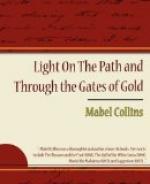Undoubtedly it is the hardest task we have yet seen set us in life, that which we are now talking of,—to free a man of all prejudice, of all crystallized thought or feeling, of all limitations, yet develop within him the positive will. It seems too much of a miracle; for in ordinary life positive will is always associated with crystallized ideas. But many things which have appeared to be too much of a miracle for accomplishment have yet been done, even in the narrow experience of life given to our present humanity. All the past shows us that difficulty is no excuse for dejection, much less for despair; else the world would have been without the many wonders of civilization. Let us consider the thing more seriously, therefore, having once used our minds to the idea that it is not impossible.
The great initial difficulty is that of fastening the interest on that which is unseen. Yet, this is done every day, and we have only to observe how it is done in order to guide our own conduct. Every inventor fastens his interest firmly on the unseen; and it entirely depends on the firmness of that attachment whether he is successful or whether he fails. The poet who looks on to his moment of creation as that for which he lives, sees that which is invisible and hears that which is soundless.
Probably in this last analogy there is a clew as to the mode by which success in this voyage to the unknown bourn ("whence,” indeed, “no traveller returns”) is attained. It applies also to the inventor and to all who reach out beyond the ordinary mental and psychical level of humanity. The clew lies in that word “creation.”
II
The words “to create” are often understood by the ordinary mind to convey the idea of evolving something out of nothing. This is clearly not its meaning; we are mentally obliged to provide our Creator with chaos from which to produce the worlds. The tiller of the soil, who is the typical producer of social life, must have his material, his earth, his sky, rain, and sun, and the seeds to place within the earth. Out of nothing he can produce nothing. Out of a void Nature cannot arise; there is that material beyond, behind, or within, from which she is shaped by our desire for a universe. It is an evident fact that the seeds and the earth, air, and water which cause them to germinate exist on every plane of action. If you talk to an inventor, you will find that far ahead of what he is now doing he can always perceive some other thing to be done which he cannot express in words because as yet he has not drawn it into our present world of objects. That knowledge of the unseen is even more definite in the poet, and more inexpressible until he has touched it with some part of that consciousness which he shares with other men. But in strict proportion to his greatness he lives in the consciousness which the ordinary man does not even believe can exist,—the consciousness which dwells in the greater universe, which breathes in the vaster air, which beholds a wider earth and sky, and snatches seeds from plants of giant growth.




